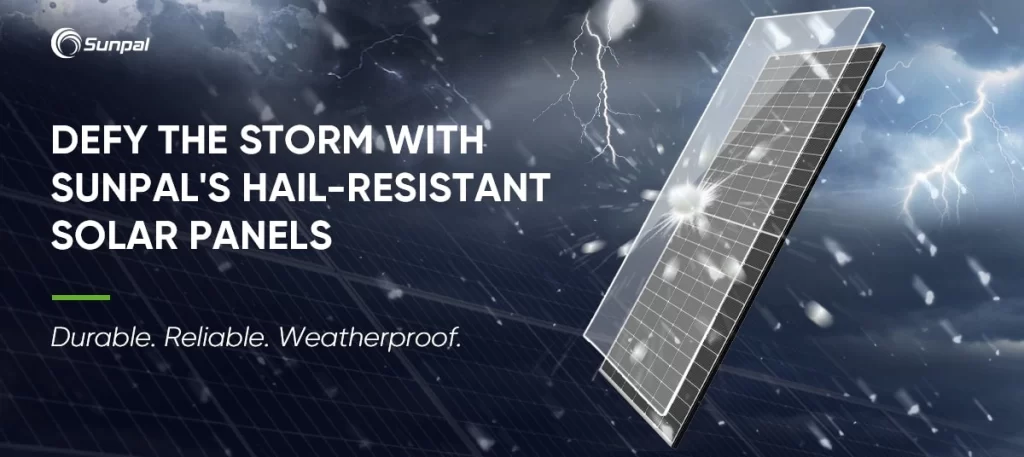
In recent years, global climate changes have triggered severe extreme weather events, including devastating hailstorms. These extreme weather conditions not only cause significant damage to lives and property but also pose serious challenges to renewable energy installations, particularly photovoltaic (PV) systems.
Hailstorms can vary greatly in severity, with hail particles ranging from a few millimeters to several centimeters in diameter. Large-diameter hailstones have high kinetic energy and may cause serious damage once they hit equipment such as solar panels. Especially when the diameter of a hailstone exceeds 3cm or even reaches 20cm, it is extremely destructive to the PV system, which may cause equipment damage or even stop operation.
The damage caused by natural disasters such as hail to solar modules cannot be ignored. The degree of damage caused by hail to solar modules is directly related to the materials used in the modules, such as the thickness of the front glass and the material of the frame. As we all know, common silicon-based solar modules are mainly composed of glass, solar cells, backsheets, adhesive films, frames, etc. The front of the solar module is covered with a layer of glass for protection. To some extent, the strength of the glass determines the ability of the module front to withstand hail. According to the front glass material, solar modules can be divided into tempered modules and semi-tempered modules. The outermost sides of the semi-tempered modules are composed of two pieces of semi-tempered glass (both 2.0mm) laminated with film and battery sheets, while the outermost front of the fully tempered solar module uses fully tempered glass (2.5mm/3.2mm/2.8mm), and the outermost back uses an organic transparent backsheet.
Studies have shown that fully tempered glass can provide better protection than semi-tempered glass due to its high strength, small particle size, and lack of sharp edges when broken. And, how resistant is fully tempered glass to hail damage?
- Hailstones Over 3cm in Diameter: Fully tempered glass offers significant resistance to hailstones larger than 3cm in diameter. This is due to its unique processing technology and physical properties that enhance its durability and impact resistance.
- High Density: The high density of fully tempered glass helps disperse the force of external impact more effectively. This means that when hailstones hit the glass, the energy is spread out over a larger area, preventing damage from being concentrated in one spot.
- Energy Dispersion: By dispersing the impact energy, fully tempered glass minimizes the risk of cracks and breakage, thereby maintaining the integrity of the solar panel.
With the increasing frequency of extreme weather events due to global climate change, selecting high-quality panel materials is essential for enhancing the overall resilience and long-term reliability of the system. Sunpal recognizes the importance of this issue and has implemented various designs to withstand extreme outdoor conditions in its TOPCON 2.0 series solar products, ensuring durability and efficient power generation.
Take Sunpal's popular TOPCon HiMAX5N single-glass solar modules as an example. The HiMAX5N solar module features a 3.2mm fully tempered glass, a transparent grid backsheet, and an aluminum alloy frame, providing excellent performance advantages:
- Enhanced Hail Resistance: Capable of withstanding impacts from large hailstones, and reducing the risk of damage.
- Better Temperature Coefficient: Maintains efficiency in high-temperature environments, reducing power loss.
- Reduced Hot Spot Effect: Minimizes power attenuation and extends the lifespan of modules.
- Wind and Snow Resistance: Robust design ensures stability in extreme weather conditions.
- ZERO LID (Light Induced Degradation): The N-type solar cell inherently avoids LID, ensuring sustained power production throughout the lifespan.
- Better Weak Illumination Response: Delivers higher power output even under low-light environments like on cloudy or foggy days
- Eco-friendly: Uses organic polymer materials, reducing carbon emissions and ensuring recyclability.
Then, you may have questions like this:
Will fully tempered glass increase the weight of solar panels?
- Fully tempered glass is stiffer than standard or semi-tempered glass, potentially increasing the panel's weight slightly. However, this increase is often optimized in the design process, ensuring it does not compromise installation and maintenance.
- The 3.2mm fully tempered glass used in the HiMAX5N modules balances impact resistance and durability with minimal weight addition. Despite being slightly heavier than panels using thinner glass, the enhanced protection and extended lifespan justify this minor weight increase.
- Modern installation techniques and support structures are well-adapted to the weight of fully tempered glass, ensuring no material impact on the structural stability or installation process of the solar system.
Furthermore, with the rapid development of the solar energy market and the advancement of production technology, the production cost of fully tempered glass is gradually decreasing. This means that while fully tempered glass solar panels may cost slightly more than products using standard glass, the price gap is closing.
All in all, Sunpal’s TOPCON mono solar panels ensure safety, durability, and long-term performance by using 3.2mm fully tempered glass and other high-performance materials in the face of extreme weather such as hail, thereby providing users with a premium solar solution that can operate stably in various environments.
As a world-leading manufacturer of solar products, Sunpal strives to achieve a harmonious balance between cost and performance in the design and production of solar panels. Therefore, by choosing Sunpal's TOPCON 2.0 series of products, customers can get solar solutions that are carefully designed and manufactured using high-quality materials. Even if the initial investment is slightly higher, these products will deliver long-term value that exceeds expectations.
The world is changing, and solar panel technology is adapting accordingly. Sunpal will continue to be committed to promoting this process and continuously develop and provide photovoltaic products with high adaptability and long-term vision. For those seeking enduring and resilient PV investments, the TOPCON 2.0 series offered by Sunpal is an ideal choice.
Don't let hail rain on your solar parade! Choose Sunpal for worry-free solar power.
